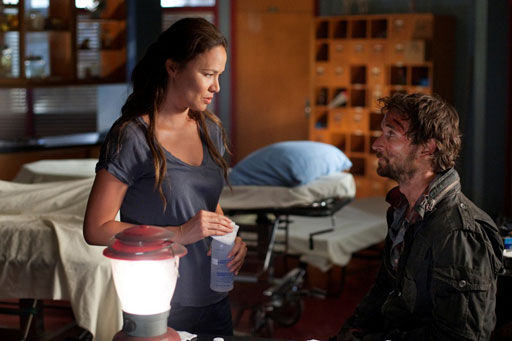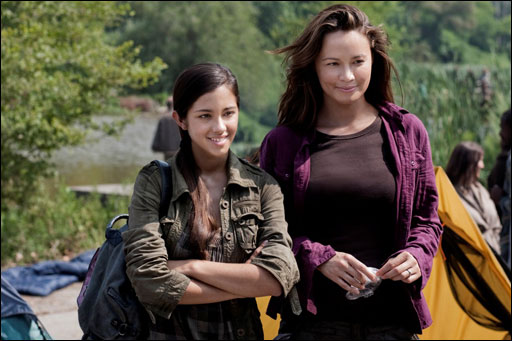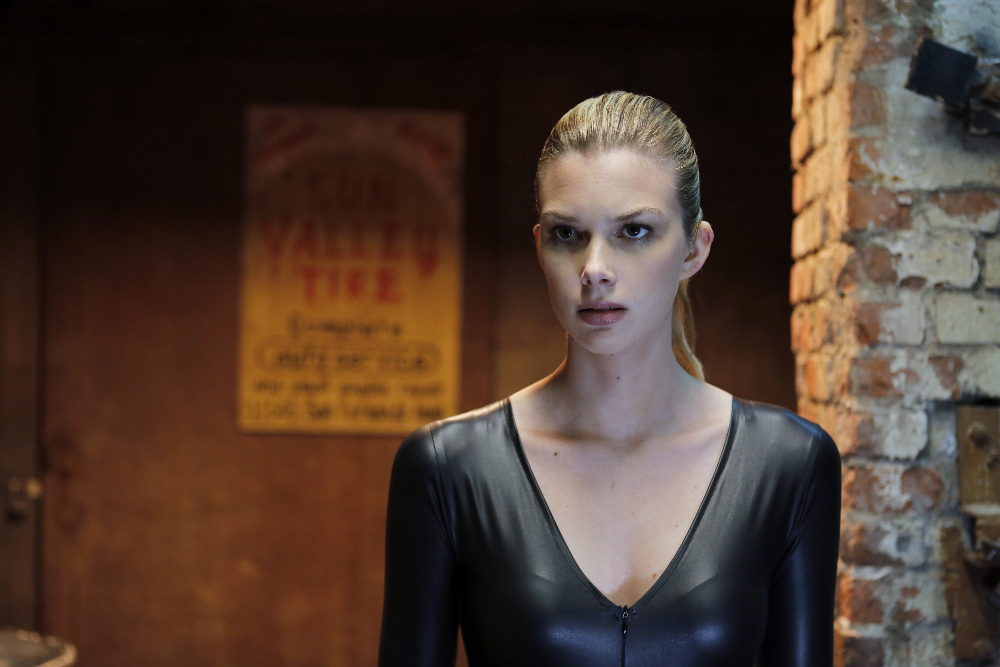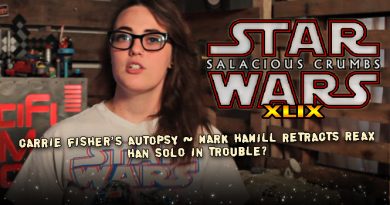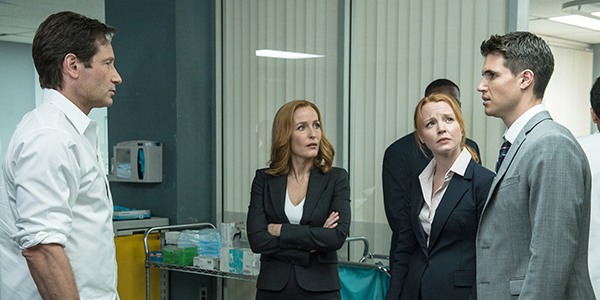Glass Half Full: Moon Bloodgood on "Falling Skies"
“Falling Skies” continues to be a ratings winner for TNT. The third episode (in its regular time slot) pulled in 4.2 million viewers, gaining 23% from “Leverage” as the lead-in. And even though “Skies” is down from the premiere week, it’s still a strong show. Especially when you take into account all of the Live-Plus viewers that usually attend genre programs.
Earlier we shared the conference call with Noah Wyle, where he talked about the show and how humans are the “new polar bears”. Here’s the other conference call we had, this one with Moon Bloodgood, who plays Dr. Anne Glass, who may become the conscience of the 2nd Massachusetts.
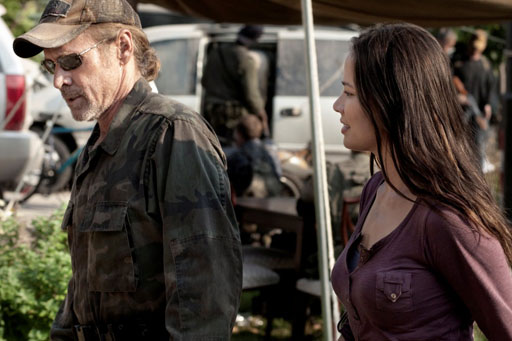
Jason Hunt: Your approach to Dr. Glass, how is it different from your first other – other science fiction characters — because like you said you’re not the action character this time, you’re not the girl with the gun, you’re more of a nurturing type — and how is that playing into the tension that we’re starting to see in the first couple of episodes between Dr. Glass and Captain Weaver?
Moon Bloodgood: Oh yes, let me just tell you that scene that I got to do with Will in the beginning is one of my favorites; I just – I love working with Will Patton.
I loved being able to humbly be the voice of the civilians, because I’m not just a doctor but I’m their – they have my ears. I’m dealing with then, they’re the ones we’re fighting for and I have to remind, you know, Will Patton’s character of that — that this is what’s important, don’t lose sight of that in your need to protect your fighters, remember what the cause is and humanity is the most paramount thing.
And in playing a role as a pediatrician — which is what Anne Glass was — I was certainly a doctor who is capable but in over my head. So I prepared but I also wanted to seem like I was a little out of my element because then when I am (deharnessing) kids and, you know, performing surgeries and I’m just way out of my element.
And I wanted to play something that was more cerebral but – and look confident at it but also look like I was a little bit – a little scared, a little, you know, not someone totally in control and I’ve never played something like that.
Jason Hunt: And how much of the stuff that we see on screen is actually following the script? Do you guys have a lot of room to maneuver with the writers as you’re shooting these scenes?
Because Noah was talking about how sometimes the two of you would develop some themes to try to bring out a little bit of the romantic aspects of that relationship and they kind of seem to fall a little short in terms of fitting into the entire piece.
Is that something that you guys just kind of developed as you went along in the series? How much improvisation were you able to do?
Moon Bloodgood: I don’t think there’s a lot of improvisation in TV but I do find that TNT does give you room for creativity, it’s just at that TV’s a different medium than film and the rules are different.
That being said, I do feel that Noah had lots of creative control and certainly my input was welcomed and there were times when yes the director comes in and they know there’s a certain part of space in the script in the show that we’re supposed to fill in and that is not supposed to be completely – you know, we’re not just puppets, we do have our own ideas.
I usually don’t improv a lot unless I really feel something’s important. We changed things medically but everything is always discussed and some things are received and some things are not.
I would say with the romantic part of it no, and I know he wanted it to be a little played down; we wanted to respect the fact that we had both been married — and still are — and lost our spouses and not to jump too quickly into a romantic thing. We didn’t want to saturate the TV and with – and cheapen what we had and we really wanted to build anticipation.
There were certainly scenes that were changed, I felt like Noah and Will did that more than I did; I kind of played more I think by the book probably just because I’m just more of a coward.
But there were – I can’t come – nothing comes to mind right now but I’m sure there were things that we shifted and changed because we knew our characters the best.
Patrick Douglas (Great Falls Tribune): Now just to get right in to the meat of this, aliens parking over cities has been kind of a common theme recently with shows like District 9, Skyline, Battle: Los Angeles and of course “V”. In your opinion what do you think separates this series from the other recent alien invasion franchises?
Moon Bloodgood: Well I think ultimately if you’re, you know, if you’re going to like a show – I mean we’re all kind of, you know, dealing with the same subject matter, I think what’s going to be different is certainly out approach sort of the science fiction aspect of it it’s going to be a little – it’s going to vary but if you like the story, the human story behind it and like – you want to follow the characters and that’s what’s going to bring you to it.
And we’re much more drama and more of a human element than like a District 9 which I think is primarily more about – though a great story, one of my favorite science fiction films, there’s definitely more of a science fiction element than I think we have. I think we’re sort watch – of having the marriage of a good family story with the science fiction element.
Patrick Douglas: You’ve also been a part of, you know, post apocalyptic shows before with Terminator and, you know, you’re starting to carve a little niche in this genre, I mean, what’s the draw for you?
Moon Bloodgood: I think I’ve been drawn to science fiction because I’m a fan of science fiction. And I think when you like something you just – I like to think you’re generally better at it and when you’re auditioning for something maybe that sort of resonates. But I – because I love it, I tend to want to do those kind of protects. And then you start to do them and that kind of becomes your thing which is not a bad thing because it’s still a genre I deeply appreciate.
Mike Gencarelli (MovieMikes): You know, my first question I want to know, what do you like most about your character Anne Glass?
Moon Bloodgood: I really enjoy the fact that, you know, she’s a doctor — she was a pediatrician — and that I think that she’s very admirable, that she doesn’t often talk about herself, extremely selfless, always calm and rational, always, you know, being fair and with reason. And I think I admired her because I feel sometimes I’m not always that way and she was always selfless and always very maternal towards everyone.
Mike Gencarelli: Definitely. And, you know – all right so what would you – stands out for you as like the most difficult part for you on the series, if anything stands out to you?
Moon Bloodgood: Sometimes the subject matter is heavy and there’s lot of depth and weight and you have to think about – you have to take yourself to that place of, you know, you’re supposed to be hungry and scared and you’ve lost your family and sometimes you want levity. And I can find the subject matter to be – to weigh on me at times when I was working and all I wanted to do was just, you know, I’d go home and just put some comedy on and have a beer because I just needed some sort of change.
But I think no matter how much I can resist it, I gravitate towards these kinds of subject matters and I like the drama and that’s where I feel the most comfortable and probably that’s why that’s what I do the most.
Jenny Riordan (TV Is My Pacifier): Okay so you guys have kind of talked about this already but there – I think with this premise there are going to be a lot of expectations.
Moon Bloodgood: Yes.
Jenny Riordan: How are you and the rest of the cast and the crew dealing with the pressure of that?
Moon Bloodgood: I’m wondering like why I don’t feel more pressure. I don’t know if I’m – I just kind of disconnect because I need normalcy in my life; I don’t feel any pressure, I don’t. I feel like at this point like, you know what let the, you know, chips fall where they fall.
I’m – I’ve done the work, I feel confident in the content and I don’t think we’re trying to make some like, you know, revolutionary like novel stance on aliens, we’re just trying to make a simple family show about human survival and that takes precedent and this science fiction element I think is secondary. It’s not just an action show; it’s you just – do you want to go on this journey with these people, do you understand what they’re going through?
I can’t say I’m not going to be disappointed if it’s not well received but I’m certainly think – and I’m also not a veteran but I think I’ve learned to try to not get caught up in the expectation game because that can be so – it’s just so easy to do when you’re an actor and I think it’s not healthy. So I’m trying to stay very adult-like about it.
Jenny Riordan: Well I have high expectations for it just simply because of the cast. How did that come about for you and, you know, how did – do you know how the show came about or…
Moon Bloodgood: I have vague memories of I think it was Spielberg and Michael Wright came up with it together and then kind of brought Robert Rodat into it, you know, real great writer, wrote Saving Private Ryan.
And then by the time it found its way to me — I don’t think this was probably a year after it — Noah was already on board, I think other people had already been cast and I think originally I was supposed to be like an art dealer or some sort of artist. But I wasn’t the primary focus in the first episode, you know, it was about the Mason family and I was someone who was going to connect with Noah Wyle’s character, maybe a romantic twist was going to happen.
So I saw just, you know, a basic show that had really good people involved but I think it was something that Spielberg obviously initiated and then it kind of came into fruition.
Lisa Steinberg (Starry Constellation magazine): I know you talked a little bit about talking – when you talked about Noah and I’m wondering if you could a little bit go more in depth about how it was getting to go work with him, and of course I know obviously there’s, you know, young children involved with the show as well.
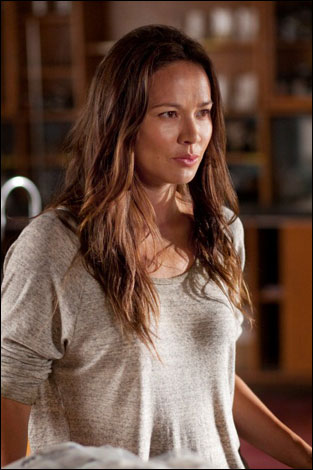 Moon Bloodgood: Yes there are young children that I have some scenes with. But listen Noah’s a veteran, I play a doctor, trust me he gave me lots of pointers and I was so happy to, you know, to receive his advice. He’s been around, he knows the industry and he is just such a diligent professional.
Moon Bloodgood: Yes there are young children that I have some scenes with. But listen Noah’s a veteran, I play a doctor, trust me he gave me lots of pointers and I was so happy to, you know, to receive his advice. He’s been around, he knows the industry and he is just such a diligent professional.
I learned a lot; I learned a lot from him and Will Patton. I think you learn something from everyone that you work with but he gave a different perspective and I thought he was really good at being our leader and – in the show and also off, you know, like, you know, as a friend and a colleague.
Pietro Filipponi (The Daily Blam!): You know, I was wondering what inspiration did you draw from, I mean, if any coming into this? Anne’s a very tragic character even though she hasn’t fully started to cope with her loss, you know, she’s like – you know, she throws herself into her work and her blossoming relationship with Tom, but how did you come about figuring out how to portray her and how not to, you know, to hold some back for later on in the season?
Moon Bloodgood: Good question. I sometimes think it’s probably not good to use your own life circumstances because that can kind of get tiring, but I did. I kind of dove – not dove into it but I conjured up or — what’s the word I’m looking for — I looked into myself and my own pain and tried to use that as a cathartic thing when I was doing the role.
And then I just also try to use my imagination of what it felt like to live in a world where suddenly I lost my family and to lose a child which I – you know, must be the most horrendous thing to ever go through is to lose a child. So I tried to use myself and my imagination.
And the journey’s interesting because there’s a couple times when I breakdown; I breakdown emotionally about my family, and there’s another time when I am fighting to, you know, keep the alien alive with another doctor and I’m very stoic in that fight, and there’s a time when I’m more romantically involved with Noah.
But what’s – what was the most compelling part is when I had to actually pick up a gun at one point because I get hurt, I get attacked and I suddenly need to defend myself against other humans and that’s a position that Anne Glass never thought she would be in. And for her that’s when the world – the first biggest pain was her husband and her child and the next was just loosing that innocence against violence.
Kenn Weeks (Wormhole Riders News Agency): I’ve really enjoyed your career…
Moon Bloodgood: Thank you.
Kenn Weeks: …since well before Eight Below. In “Falling Skies” you play quite a different character although I do see some of you in the role; how much of you is in the role in “Falling Skies”?
Moon Bloodgood: Well I try to be, you know, a good actress and not bring myself into it but I believe all actors bring an essence of themselves, you just can’t squash that, you can’t eliminate it, it’s part of you.
In this role I play a doctor and I’m so level headed and I’m not the athlete and I’m not the vixen or the girl that’s the tomboy I’m just, I’m someone who’s there to – who’s not only maternal but who’s going to medically heal people and is against violence.
So I felt it was very different for me whether or not – yes I guess I bring myself into everything — I try not to — and give it a little bit more life. But there’s always a part that you’re not bringing it to the writing, it’s how you’re written and that has nothing to do with you.
Brittany Frederick (Digital Airwaves): I just want to throw out, I still miss “Daybreak”.
Moon Bloodgood: I do, too. I think Taye just texted me that he’s (insane jealous) of the show and you’re just like, “wow I’m on another science fiction show.” I mean Taye was just one of the most wonderful people I’ve ever worked with.
Brittany Frederick: Awesome. Well I (spoke from R) and they keep telling us, you know, “don’t reveal certain things, don’t spoil the surprise.” So I’m wondering from your end how much did you know in advance as episodes were going on, and how much did you want to know?
Moon Bloodgood: I – well with TV things are happening where you’re getting the scripts and you don’t know – you don’t have a long time to digest the changes and changes happen. You know, when you’re working on a movie you get the script, you know the whole outline before you start. So that part’s a little disconcerting at times but also really keeps you on your game and on point.
So I would prefer to know sometimes but maybe it’s good that we find out; we don’t try to put too much of ourselves in it, we just do what we’re told to do, you know? Like we’re there to fulfill a story and not try to like, you know, like wet the screen with our interpretation of it.
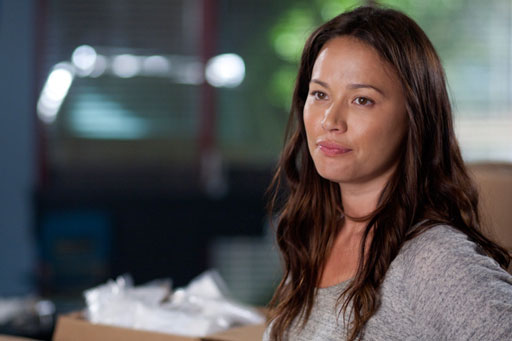
Earl Dittman (Wireless Magazines): Well, you know, I had the wonderful luck of seeing the, you know, the first opening two-hour special and it is unbelievable. I mean I was just blown away by how exciting and how well acted and everything — special effects.
Moon Bloodgood: Oh wow, because I haven’t seen it so you’re beating me on that one.
Earl Dittman: But the weird thing about it is, is it brings a lot – it brings lot to the table, there’s a little something for everybody; you know, it’s not exactly a sci-fi film, it’s a drama, it’s a love story, it’s a family film, you know, it’s so many different things. What was some of the things that really, really attracted you to it?
Moon Bloodgood: That, you know — doing something that is not just one dimensional; it’s science fiction but it’s human tragedy, it’s different diverse characters interwoven together and trying it kind of find their humanity and live any kind of normalcy and readjust to the new world that’s changed completely from the world that they know.
So I think I want to do projects – I mean I was also drawn to playing a doctor and it’s something I’d never done, I’d played a nurse before but it has to be – you know, and I’d have to have a gun on my leg and be running around and doing stunts, though I love that to death.
I wanted to do something more cerebral and that I got to be a little softer and I thought that was a more fun place for me to be in this, you know, in this time in my life.
Earl Dittman: Are you in line for another Terminator movie?
Moon Bloodgood: Not that I know of. I don’t know even know, is there another one being made?
Patrick Douglas: Well as far as the sets go for this, because you guys are in an urban isolation setting and talk about that a little bit how, you know, how did that work having – you know, obviously you have the school and various neighborhoods and whatnot but how did that work for you guys?
Moon Bloodgood: We had to find, you know, we shot in Toronto and we – I really wanted to shoot in Boston. It’s hard to find a place that kind of can resemble Boston’s kind of colonial look, I mean it’s very different, very unique and you can’t just build the sets; I guess you certainly could, it wouldn’t be cost effective. But you want to have that look and there’s not many places to go for that and I think that’s why it was Toronto.
And I would love to shoot in Montana but – and even though there’s some things that we could have done like, you know, the school and things like that they were – there were other sort of like brownstones and things that you saw in the background that needed to look very Bostonian.
Operator: We’ll go to our next question comes from Christopher Daley with actionflickchick.com.
Christopher Daley (Action Flick Chick): You’re filling a family drama inside a war epic, what kind of things does the shoot do to make sure that the family drama doesn’t get overshadowed by the aliens and the special effects?
Moon Bloodgood: I think primarily when Rob Rodat wrote this — and he’s from Boston — that it was always a human drama and not – a simple story about a family; that was supposed to be the paramount story and then the science fiction kind of secondary.
I don’t – the reason I don’t think we get overshadowed by the science fiction is because it sort of goes on and off where we go family story, and that stays but then the second episode will be filled with science fiction, then we take a break and we get away from all that — the guns and action — and go back to a love of the dialogue and the interpersonal relationships.
I really truly believe we did succeed in always keeping the family structure and the human element of it in the forefront and the science fiction secondary because I do think sometimes science fiction, if you don’t have a good story behind it, it can become one dimensional.
All photos: TNT [Show site on TNT]


